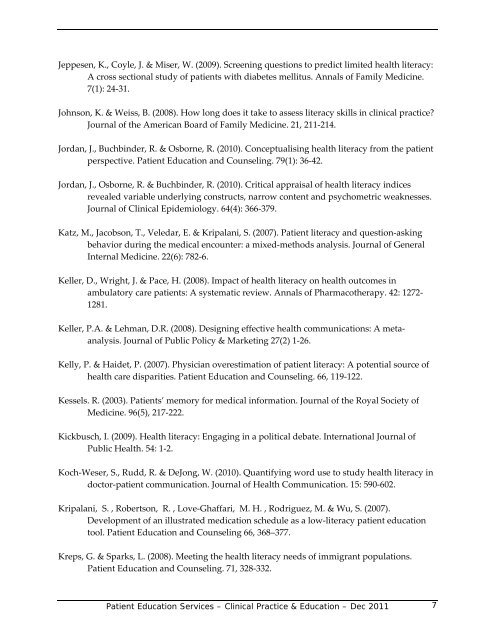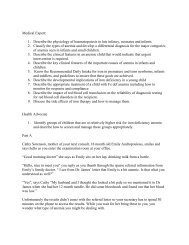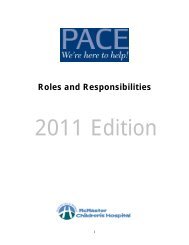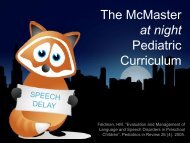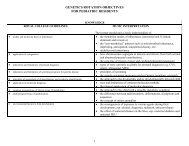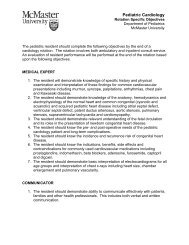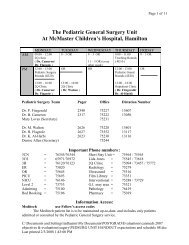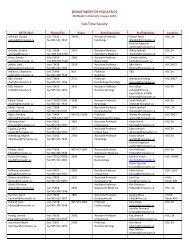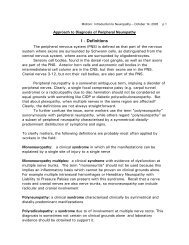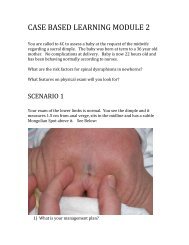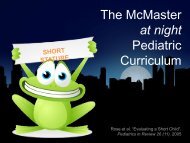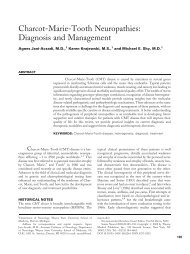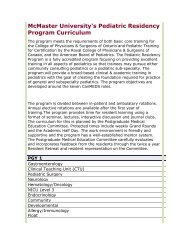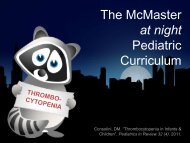Jeppesen, K., Coyle, J. & Miser, W. (2009). Screen<strong>in</strong>g questions to predict limited health literacy:A cross sectional study of patients with diabetes mellitus. Annals of Family Medic<strong>in</strong>e.7(1): 24‐31.Johnson, K. & Weiss, B. (2008). How long does it take to assess literacy skills <strong>in</strong> cl<strong>in</strong>ical practice?Journal of the American Board of Family Medic<strong>in</strong>e. 21, 211‐214.Jordan, J., Buchb<strong>in</strong>der, R. & Osborne, R. (2010). Conceptualis<strong>in</strong>g health literacy from the patientperspective. Patient Education and Counsel<strong>in</strong>g. 79(1): 36‐42.Jordan, J., Osborne, R. & Buchb<strong>in</strong>der, R. (2010). Critical appraisal of health literacy <strong>in</strong>dicesrevealed variable underly<strong>in</strong>g constructs, narrow content and psychometric weaknesses.Journal of Cl<strong>in</strong>ical Epidemiology. 64(4): 366‐379.Katz, M., Jacobson, T., Veledar, E. & Kripalani, S. (2007). Patient literacy and question‐ask<strong>in</strong>gbehavior dur<strong>in</strong>g the medical encounter: a mixed‐methods analysis. Journal of GeneralInternal Medic<strong>in</strong>e. 22(6): 782‐6.Keller, D., Wright, J. & Pace, H. (2008). Impact of health literacy on health outcomes <strong>in</strong>ambulatory care patients: A systematic review. Annals of Pharmacotherapy. 42: 1272‐1281.Keller, P.A. & Lehman, D.R. (2008). Design<strong>in</strong>g effective health communications: A metaanalysis.Journal of Public Policy & Market<strong>in</strong>g 27(2) 1‐26.Kelly, P. & Haidet, P. (2007). Physician overestimation of patient literacy: A potential source ofhealth care disparities. Patient Education and Counsel<strong>in</strong>g. 66, 119‐122.Kessels. R. (2003). Patients’ memory for medical <strong>in</strong>formation. Journal of the Royal Society ofMedic<strong>in</strong>e. 96(5), 217‐222.Kickbusch, I. (2009). <strong>Health</strong> literacy: Engag<strong>in</strong>g <strong>in</strong> a political debate. International Journal ofPublic <strong>Health</strong>. 54: 1‐2.Koch‐Weser, S., Rudd, R. & DeJong, W. (2010). Quantify<strong>in</strong>g word use to study health literacy <strong>in</strong>doctor‐patient communication. Journal of <strong>Health</strong> Communication. 15: 590‐602.Kripalani, S. , Robertson, R. , Love‐Ghaffari, M. H. , Rodriguez, M. & Wu, S. (2007).Development of an illustrated medication schedule as a low‐literacy patient educationtool. Patient Education and Counsel<strong>in</strong>g 66, 368–377.Kreps, G. & Sparks, L. (2008). Meet<strong>in</strong>g the health literacy needs of immigrant populations.Patient Education and Counsel<strong>in</strong>g. 71, 328‐332.Patient Education Services – Cl<strong>in</strong>ical Practice & Education – Dec 2011 7
Kumar, D., Sanders, L., Perr<strong>in</strong>, E., Lokker, N., Patterson, B., Gunn, V., F<strong>in</strong>kle, J., Franco, V.,Choi, L. & Rothman, R. (2010). Parental understand<strong>in</strong>g of <strong>in</strong>fant health <strong>in</strong>formation:<strong>Health</strong> literacy, numeracy , and the Parental <strong>Health</strong> <strong>Literacy</strong> Activities Test (PHLAT).Academic <strong>Pediatrics</strong>. 10(5): 309‐316.Lipkus, I. & Hollands, J. (1999). The visual communication of risk. Journal of the NationalCancer Institute: Monographs 25, 149‐163.Lorenzen, B., Melby, C. & Earles, B. (2008). Us<strong>in</strong>g pr<strong>in</strong>ciples of health literacy to enhance the<strong>in</strong>formed consent process. AORN. 88(1): 23‐29.Lui, C., Kemper, S. & McDowd, J. (2009). The use of illustration to improve older adults’comprehension of health‐related <strong>in</strong>formation: Is it helpful? Patient Education andCounsel<strong>in</strong>g. 76(2): 283-288.Macht<strong>in</strong>ger, E., Wang, F., Chen, L., Rodriguez, M., Wu, S. & Schill<strong>in</strong>ger, D. (2007). A visualmedication schedule to improve anticoagulation control: A randomized, controlled trial.The Jo<strong>in</strong>t Commission Journal of Quality and Patient Safety. 33(10), 625‐635.Mancuso, J. (2009). Assessment and measurement of health literacy: An <strong>in</strong>tegrative review ofthe literature. Nurs<strong>in</strong>g and <strong>Health</strong> Sciences. 11: 77‐89.Mancuso, C. & R<strong>in</strong>con, M. (2006). Impact of health literacy on longitud<strong>in</strong>al asthma outcomes.Journal of General Internal Medic<strong>in</strong>e. 21, 813‐817.Maniaci, M., Heckman, M. & Dawson, N. (2008). Functional health literacy and understand<strong>in</strong>gof medications at discharge. Mayo Cl<strong>in</strong>ic Proceed<strong>in</strong>gs. 83(5): 554‐558.Mart<strong>in</strong>, L., Ruder, T., Escarce, J., Ghosh‐Dastidar, B., Sherman, D., Elliot, M., Bird, C., Fremont,A., Gasper, C., Culbert, A., & Lurie, N. (2009). Develop<strong>in</strong>g predictive models of healthliteracy. Journal of General Internal Medic<strong>in</strong>e. 24(11): 1211‐1216..Mazor, K., Baril, J., Dugan, E., Spencer, F., Burgw<strong>in</strong>kle, P. & Gurwitz, J. (2007). Patient educationabout anticoagulant medication: Is narrative evidence or statistical evidence moreeffective? Patient Education and Counsel<strong>in</strong>g. 69, 145‐157.McCray, A. (2005). Promot<strong>in</strong>g health literacy. Journal of American Medical InformaticsAssociation. 12(2): 152‐163.Miller, M., Allison, J., Schmitt, M. Ray, M. & Funkhouser, E. (2010). Us<strong>in</strong>g s<strong>in</strong>gle‐item healthliteracy screen<strong>in</strong>g to identify patients who read written nonsteroidal anti‐<strong>in</strong>flammatorymedic<strong>in</strong>e <strong>in</strong>formation provided at pharmacies. Journal of <strong>Health</strong> Communication. 15:413‐427.Patient Education Services – Cl<strong>in</strong>ical Practice & Education – Dec 2011 8
- Page 3 and 4: Health Literacy in Pediatrics 2012W
- Page 5 and 6: Health Literacy in Pediatrics 2012P
- Page 7 and 8: Health Literacy in Pediatrics 20124
- Page 10 and 11: Activity 1: Assessing health litera
- Page 13 and 14: Activity 2: Assessing the quality o
- Page 15 and 16: Sample handout (page 1 of 2)Caring
- Page 17 and 18: Webpage downloaded from www.medicin
- Page 19 and 20: Activity 3: Writing in clear langua
- Page 21 and 22: Baker, D., Wolf, M., Feinglass, J.,
- Page 23: Davis, T., Long, S., Jackson, R., M
- Page 29 and 30: Osborn, C., Weiss, B., Davis, T., S
- Page 31 and 32: Public Health Agency of Canada. How
- Page 33 and 34: Seligman, H., Wallace, A., DeWalt,
- Page 35 and 36: US Department of Health and Human S
- Page 37: Wolf, M., Davis, T., Shrank, W., Ra


